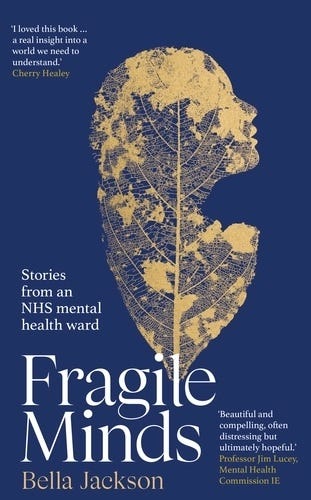I’m guessing that Rachel Clarke has never been sectioned.
Her review of Bella Jackson’s Fragile Minds smacks of professional pique. As Clarke says,
The problem with this account, for me, is that it doesn’t really resonate with my experience. I spent my first rotation as a junior doctor in psychiatry at the same time Jackson was training. I simply didn’t see the kinds of abuses Jackson documents –
Well: the problem with this review, for me, is that it doesn’t really resonate with MY experience. I’ve been sectioned twice and have been on the inside of an acute psychiatric ward, similar to the one described by Jackson. My own response to Jackson’s book is that it is ABOUT FUCKING TIME that a critical perspective of psychiatry has been given a mainstream platform. Thank you Penguin Books for publishing it.
Incidentally, Clarke’s logic is the same used by defenders of abusers. ‘He’s not like that with me,’ they say, ‘so it must be untrue.’ Never mind the testimony of the abused. The repeated and unwavering testimony of many, many people for whom psychiatric ‘treatment’ has amounted to just that: abuse.
Clarke complains that “the stories [Jackson] tells are also composites in which names and identifying details are changed. So too are the healthcare professionals depicted.” I don’t recall Clarke worrying about this last year when she reviewed Benji Waterhouse’s obnoxious account as an NHS psychiatrist, You Don’t Have to be Mad to Work Here. Yet anonymising one’s records is a necessity for any health professional who is sharing anecdotes about their worklife. So why pick on Jackson for this universally-required rhetorical device?
In fact, Clarke found Waterhouse quite the charming raconteur, slathering his book with compliments and noting appreciatively that he “has an alter ego as a standup comedian. He describes his memoir as a ‘fly-on-the-padded-wall account of my decade working in medicine’s most mysterious and controversial specialty’.” Haha. It’s funny, you see. Those crazy patients and their madcap delusions!
I find myself wondering why Clarke adores Waterhouse’s account, yet takes issue with Jackson’s? Is it because she challenges the profession, rather than coyly shrugging away its abuses? Is it because she challenges the status quo, where he clings onto it?
Clarke’s sanist attitude is apparent throughout her review of Fragile Minds. She willfully misunderstands Jackson’s thesis, admitting blithely that
Psychiatrists do indeed have an almighty power to do things to patients that in any other context would be considered human rights abuses – restraining them, injecting them with drugs, depriving them of their liberty.
and going on to insist that
this is because the most seriously unwell patients often have no idea they are ill and will not engage with treatment voluntarily.
And here is the absolute crux of the matter. The biomedical model of mental health reduces the complex, ambiguous, socially-embedded and entirely subjective experiences of extreme mental states into the simplistic, overreaching and scientifically unproven diagnostic labels of illness. We sorely need to overhaul the way that society responds to mental distress. If thirty years of the biomedical model has been so effective, then why is mental suffering so blatantly increasing?
Furthermore, I take issue with Clarke’s dismissal of the very basics of human compassion, when she sneers that
Jackson implies that treating serious mental illness is simply a matter of listening to, believing and empathising with patients.
Platforms such as Asylum Magazine, Mad in the UK, Recovery in the Bin, and Madzines offer myriad testimonies of those who have experienced ‘treatment’ in the psychiatric system. I wonder how much of this suffering could indeed have been alleviated by listening, believing, empathising? A lot, I suspect.
Jackson’s book is a refreshing addition to the discourse, offering an account from a former staffmember who gathers the courage to interrogate the practice she encounters and examine her own troubled conscience. Is this polemic, as Clarke suggests? Or is it more accurately described as whistleblowing?
Psychiatry is indeed under furious assault, as have been many of the people placed under its so-called ‘care.’ It’s time for ‘medicine’s most mysterious specialty’ to be exposed to public scrutiny.
Clarke finishes her review with “I’m afraid this book feels like scaremongering.”
And I can only reply: “I’m afraid this review feels like moral indifference.”
Fragile Minds by Bella Jackson is published by Penguin Books






Wow, sounds like she missed all the points....